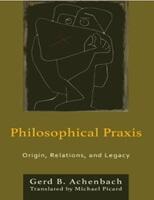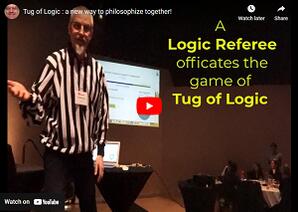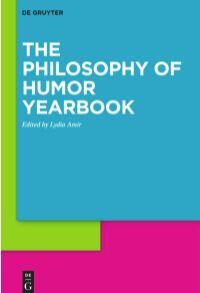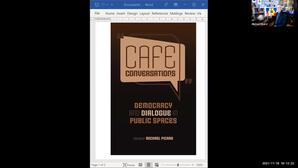Picard, Michael
Person Preferred Name
Michael Picard
Department
Related Works
Content type
Digital Document
Abstract
"Gerd B. Achenbach's Philosophical Praxis: Origin, Relations, and Legacy, translated by Michael Picard, offers unique insights into the compelling origin and development of what has been called a renaissance of philosophy: a storied trove of thought steeped in tradition, character, and experience, and redeployed in the service of understanding the individual life. Throughout this book, the author explores Philosophical Praxis not only through the tumultuous history of philosophy, but also through psychology, religion, literature, and more. Achenbach's tone is subtle, humorous, and constantly surprising, demonstrating his intimacy with an expansive spirit of life and leaving behind the narrowness of academic disciplines. As the founder of Philosophical Praxis, Achenbach dissects the challenges faced in current philosophy and psychology and, in doing so, surpasses academic philosophy to reveal the possibility of a new profession for philosophical practitioners seeking to resist the seductions of theory, methods, or solutions, and personify the seriousness of being human."-- Provided by publisher.
Origin Information
Content type
Video
Description / Synopsis
This short video documents a match of Tug of Logic (an Internet-mediated audience response system enabling reasoning together through logically-structured social feedback) that was played by Canadian high school students in the context of the 2023 Ethics Bowl national championships at the Canadian Museum for Human Rights.
Origin Information
Content type
Digital Document
Abstract
Tug of Logic was played by dozens of Canadian high school students alongside the national championships of the Canadian Ethics Bowl, which took place April 28-29, 2023, at the Canadian Museum of Human Rights in Winnipeg, MB. This event, which gave the new game--now a web app--national exposure, followed upon its invited appearance at the 2019 Canadian Ethics Bowl Championships in its former form as a board-game. An invitation to bring the Tug of Logic web app back in 2024 has already been extended.
Origin Information
Content type
Digital Document
Abstract
"How to Play Philosophy is a series of lyrical, creative essays that explore timeless and timely ideas about who we are and how we live. MIT-trained philosopher Michael Picard shares ideas of numerous. philosophers from conflicting traditions and builds an intellectual background to enable readers to draw their own conclusions." Written in a spirit of free and playful inquiry, the essays were composed originally to support public participatory philosophy, or Café Philosophy, which the author has facilitated for decades. Subjects include Play it With Feeling (Desire, Stress, Anger); Games We Play (Intimacy, Loyalty, Betrayal) and Playing Fair (Values, Good, Integrity), alongside epistemological topics including Truth (Knowledge, Certainty, Objectivity) and the perennial metaphysical quandaries (Human Nature, The Sacred, God). -- Provided by publisher.
Origin Information
Content type
Digital Document
Abstract
Prof. Amir has written a rich, complex and searching book with a vast scholarly range that defies the poor reviewer. I shall confine myself to an overview of the main theory, the worldview Homo risibilis, as well as a few of the claims she makes about its promise. I have some questions too about the dialectical logic by which we are to obtain the promised relief. I end with a brief discussion of a Theravada Buddhism perspective on desire and compassion, an alleged rival to Amir’s theory, and ask how well it fits into Amir’s typology of opposing solutions. A worldview is a theory of the human condition. As such, Homo risibilis strives to be a “traditional philosophy,” setting itself in competition with world religions and other world historic philosophies. Prof. Amir’s ambition is not so much to frame a correct theory of humor, but to apply what she takes to be a correct theory of humor (she focuses on a self-referential version of the incongruity theory) to an understanding of the human condition. Among the advantages she touts of her theory are its minimalist epistemic and metaphysical commitments, which set it above its idealist and religious rivals. Moreover, in the book’s final two chapters, a case is laid out for a suite of personal and social benefits of the worldview. In particular, an egalitarian ethics of compassion is arrived at (though at times it seems to need to be as much an input as an outcome). Though I speak here of a theory of the human condition, we are clearly not dealing with any straight forwardly verifiable empirical theory that stands or falls with consensus evidence. The proof of Homo risibilis, if it is to have one, will be shown by its fitness in our lives, by its use to readers in coping with, and reconciling with (what in technical language is known as) the shit that happens. Indeed, Amir sets the bar high, hoping to rival world religions and once “mighty philosophies.”
Origin Information
Content type
Video
Description / Synopsis
Presented at the Douglas College Research Cafe, November 18, 2021. Michael Picard presents his current work including translating two books from German by Philosopher Gerd Achenbach.
Origin Information
Content type
Digital Document
Abstract
This paper explores the virtue of integrity and certain paradoxes and problems with its assertion. It examines the social and pragmatic dimensions of integrity, especially as regards the norms of self-ascription. These generate a dangerous dialectic of perception and reality, and set up an illusory half-way house between inner possession and social attribution. The temptations to self-deception and impression management are inherent in any attempt at self-evaluation. This essay attempts to negotiate these conflicting tensions by advocating silence regarding one’s own integrity, not just instrumentally but as an intrinsic requirement of authentic integrity.
Origin Information
Content type
Digital Document
Abstract
Dr. Michael Picard (Douglas College) reviews the book <i>Philosophy, Humor and the Human Condition: Taking Ridicule Seriously</i> by Lydia Amir (2019). The book review is in Philosophy of Humor Yearbook, Vol. 2, 2021.
Origin Information
Content type
Audio
Description / Synopsis
An audio recording of a lecture by Michael Picard presented before the Gesellschaft für Philosophische Praxis, upon the invitation of Dr. Gerd Achenbach, founder and director of GPP (August 16, 2019). Delivered in German, it was entitled Bewusstsein und Realität: die Frage des Idealismus in der frühen indischen Philosophie (Consciousness and Reality: the Question of Idealism in the early Indian Philosophy). There were about 40 people in attendance, mostly from the circle of Dr. Achenbach. I owe thanks to Dr. Achenbach and his industrious assistant, Laura V. Adrian, who spent the three days prior to the talk translating my lecture and preparing me to deliver it in German.
Origin Information
Content type
Digital Document
Abstract
The lecture was presented before the Gesellschaft für Philosophische Praxis, upon the invitation of Dr. Gerd Achenbach, founder and director of GPP (August 16, 2019).
<p>Delivered in German, it was entitled Bewusstsein und Realität: die Frage des Idealismus in der frühen indischen Philosophie (Consciousness and Reality: the Question of Idealism in the early Indian Philosophy). There were about 40 people in attendance, mostly from the circle of Dr. Achenbach.
I owe thanks to Dr. Achenbach and his industrious assistant, Laura V. Adrian, who spent the three days prior to the talk translating my lecture and preparing me to deliver it in German. An audio recording (in German) is also available in DOOR.
Origin Information









![[Review of the book "Philosophy, humor and the human condition: taking ridicule seriously", by L. Amir] [Review of the book "Philosophy, humor and the human condition: taking ridicule seriously", by L. Amir]](/_flysystem/repo-service/styles/solr_grid_thumbnail/repo-service/2024-12/97332-Thumbnail%20Image.png.jpeg?itok=Ak5tgNGS)

